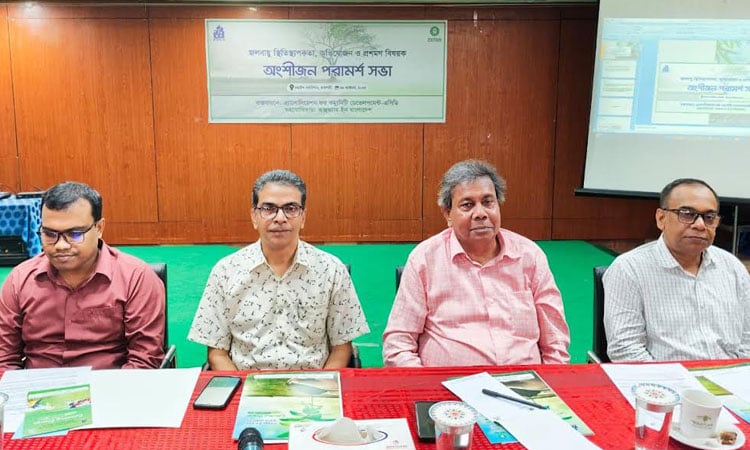News Flash
News Flash

RAJSHAHI, Oct 29, 2025 (BSS) - Integrated efforts of all the government and non-government organizations are essential to adapt to climate change in the region, particularly the water-stressed Barind area.
Climate change is posing serious threats to agriculture, fisheries, livestock, and the livelihoods of marginalized communities. Experts emphasized that collective action is crucial to ensure food security and sustainable development in the region.
Government officials, media people and development activists made the observation while addressing a stakeholder consultation on 'Climate Resilience and Adaptation' at Hotel Warisan in the city today.
Association for Community Development (ACD) as part of its 'Cultivating Change project' organized the meeting supported by Oxfam in Bangladesh.
Former Rajshahi Education Board Chairman Professor Dipakendra Nath Das, Deputy Director of the Department of Youth Development ATM Golam Mahbub, its Assistant Director Kabir Hossain and Deputy Ranger of the Department of Forest Amjad Hossain addressed the meeting as resource persons, sharing insights on climate resilience.
Subrata Kumar Paul, Project Coordinator of Cultivating Change, presented the project's objectives, strategies, and ongoing activities through a multimedia presentation.
Prof. Das highlighted the need to integrate traditional and modern farming practices to address drought challenges.
"Farmers must combine traditional cultivation methods with modern technologies. Water conservation is everyone's responsibility, and it can positively impact crop production," he said, stressing sustainable agriculture, local knowledge, and water management as effective tools against climate change.
Urging all to take individual and collective responsibility in adapting to climate change Golam Mahbub said such type of consultations will help shape future planning.
To make the Barind region climate-resilient, joint participation from all sectors is essential.
"Ensuring women's participation at all levels is crucial to building an equitable society. Women are among the most affected by climate change. Their traditional agricultural knowledge should be used to strengthen climate resilience," Mahbub noted.
Sharing her experience, woman farmer Olivia Biswas said, "Earlier, we used to grow only one type of crop. Now we have diversified, which helps sustain our livelihoods even during droughts."
She noted that the drought in the Barind region is intensifying, severely affecting food production and community livelihoods.